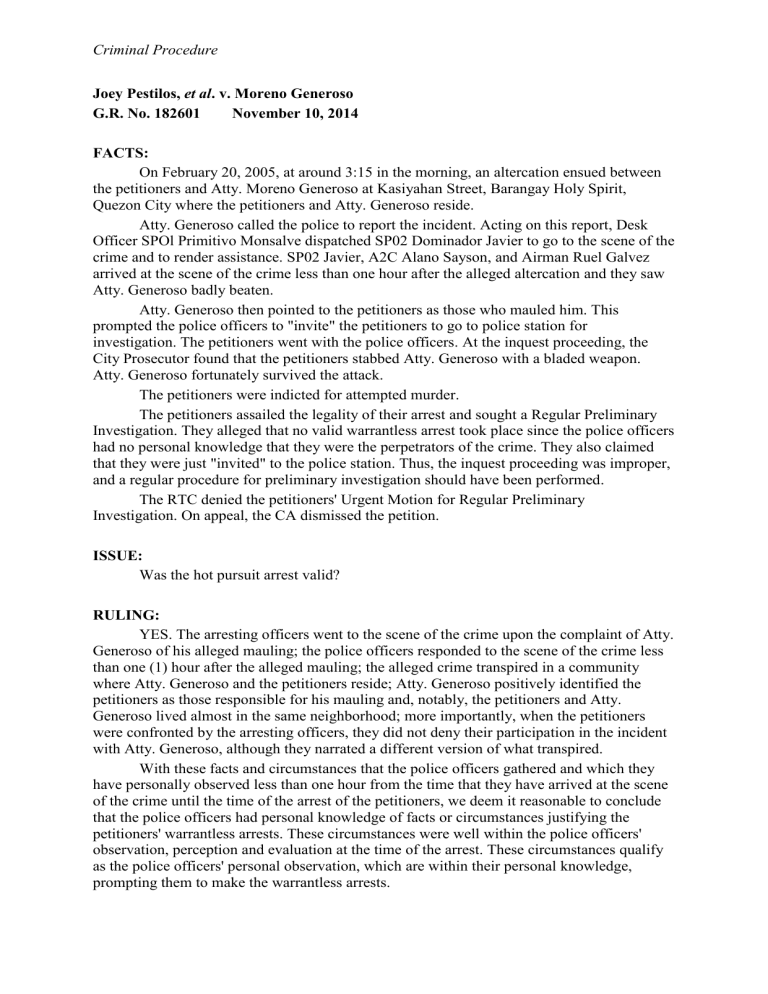
Criminal Procedure Joey Pestilos, et al. v. Moreno Generoso G.R. No. 182601 November 10, 2014 FACTS: On February 20, 2005, at around 3:15 in the morning, an altercation ensued between the petitioners and Atty. Moreno Generoso at Kasiyahan Street, Barangay Holy Spirit, Quezon City where the petitioners and Atty. Generoso reside. Atty. Generoso called the police to report the incident. Acting on this report, Desk Officer SPOl Primitivo Monsalve dispatched SP02 Dominador Javier to go to the scene of the crime and to render assistance. SP02 Javier, A2C Alano Sayson, and Airman Ruel Galvez arrived at the scene of the crime less than one hour after the alleged altercation and they saw Atty. Generoso badly beaten. Atty. Generoso then pointed to the petitioners as those who mauled him. This prompted the police officers to "invite" the petitioners to go to police station for investigation. The petitioners went with the police officers. At the inquest proceeding, the City Prosecutor found that the petitioners stabbed Atty. Generoso with a bladed weapon. Atty. Generoso fortunately survived the attack. The petitioners were indicted for attempted murder. The petitioners assailed the legality of their arrest and sought a Regular Preliminary Investigation. They alleged that no valid warrantless arrest took place since the police officers had no personal knowledge that they were the perpetrators of the crime. They also claimed that they were just "invited" to the police station. Thus, the inquest proceeding was improper, and a regular procedure for preliminary investigation should have been performed. The RTC denied the petitioners' Urgent Motion for Regular Preliminary Investigation. On appeal, the CA dismissed the petition. ISSUE: Was the hot pursuit arrest valid? RULING: YES. The arresting officers went to the scene of the crime upon the complaint of Atty. Generoso of his alleged mauling; the police officers responded to the scene of the crime less than one (1) hour after the alleged mauling; the alleged crime transpired in a community where Atty. Generoso and the petitioners reside; Atty. Generoso positively identified the petitioners as those responsible for his mauling and, notably, the petitioners and Atty. Generoso lived almost in the same neighborhood; more importantly, when the petitioners were confronted by the arresting officers, they did not deny their participation in the incident with Atty. Generoso, although they narrated a different version of what transpired. With these facts and circumstances that the police officers gathered and which they have personally observed less than one hour from the time that they have arrived at the scene of the crime until the time of the arrest of the petitioners, we deem it reasonable to conclude that the police officers had personal knowledge of facts or circumstances justifying the petitioners' warrantless arrests. These circumstances were well within the police officers' observation, perception and evaluation at the time of the arrest. These circumstances qualify as the police officers' personal observation, which are within their personal knowledge, prompting them to make the warrantless arrests. Criminal Procedure In determining the reasonableness of the warrantless arrests, it is incumbent upon the courts to consider if the police officers have complied with the requirements set under Section 5(b), Rule 113 of the Revised Rules of Criminal Procedure, specifically, the requirement of immediacy; the police officer's personal knowledge of facts or circumstances; and lastly, the propriety of the determination of probable cause that the person sought to be arrested committed the crime. The records show that soon after the report of the incident occurred, SPOl Monsalve immediately dispatched the arresting officer, SP02 Javier, to render personal assistance to the victim. This fact alone negates the petitioners' argument that the police officers did not have personal knowledge that a crime had been committed - the police immediately responded and had personal knowledge that a crime had been committed.1âwphi1 To reiterate, personal knowledge of a crime just committed under the terms of the above-cited provision, does not require actual presence at the scene while a crime was being committed; it is enough that evidence of the recent commission of the crime is patent (as in this case) and the police officer has probable cause to believe based on personal knowledge of facts or circumstances, that the person to be arrested has recently committed the crime. Considering the circumstances of the stabbing, particularly the locality where it took place, its occasion, the personal circumstances of the parties, and the immediate on-the-spot investigation that took place, the immediate and warrantless arrests of the perpetrators were proper. Consequently, the inquest proceeding that the City Prosecutor conducted was appropriate under the circumstances.

